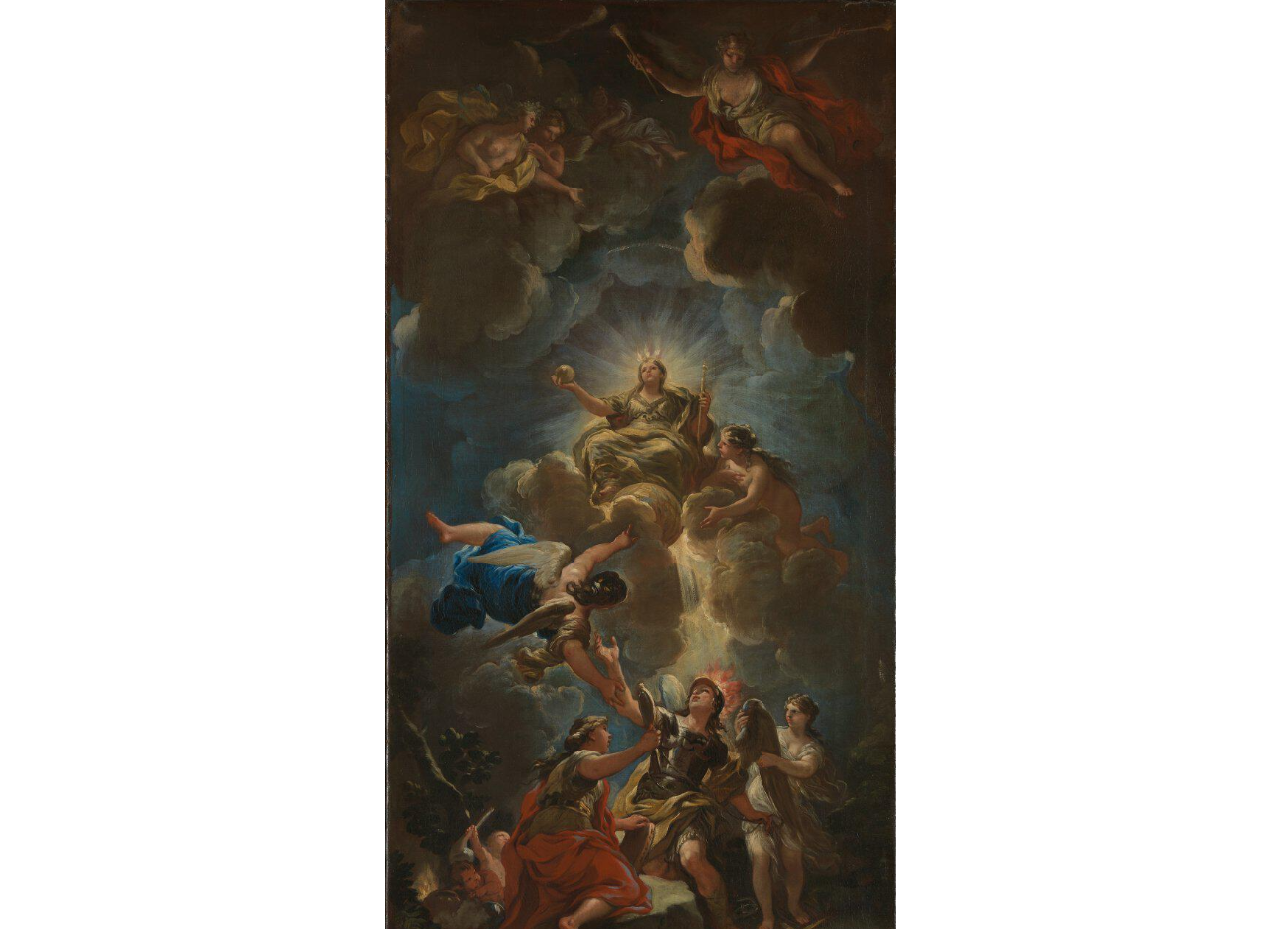+39 0669887260 | info@wucwo.org | Contact us
Art for Meditation - September 2024

Luca Giordano (Naples 1634 - 1705), Allegory of the divine Wisdom, 1680 circa, oil on canvas, cm 138,5 x 65,2, London, National Gallery
The virtues: the divine Wisdom
Luca Giordano was called by the marquis Francesco Riccardi to fresco some rooms built to expand the Florentine palace that the rich family had bought in 1659 from the Medici, their allies. This model, or detailed oil study, is part of a group of 12 that Giordano made in preparation for the ceiling frescoes of Palazzo Medici Riccardi in Florence in 1682-85. The general theme of these highly elaborate and impressive frescoes is the progress of humanity through wisdom and virtue.
The majority of the frescoes were designed for the Gallery on the first floor, but our allegory of divine Wisdom was commissioned for the Library. Looking at it, from the daring foreshortening and the view from below up we immediately understand that the painting had to decorate a ceiling. Many are the characters that crowd it, not all equally well defined. We must not forget that we are faced with a model, which aims to present to the client, in this case the Marquis Francesco Riccardi, the subject as a whole, to have a definitive agreement or make changes before starting the fresco. This is why models are generally less elaborate, as in our case.
But now let us concentrate our gaze on the painting. It is divided in two, because the lower part is developed on earth, while the upper one hovers in the sky crowded with angels and clouds. And right in the center of the sky we find a feminine figure on a throne with the globe and scepter. It represents Wisdom and the light shining from behind her head illuminates the whole painting. Her gaze is lost in eternal space. And it is to her that the only human character we find in the lower part of the painting looks to. It is the kneeling warrior, representing the human intellect, depicted here as a young man freed from the constraints of ignorance. He is assisted by Mathematics, which gives him wings - with which he can soar to the heights of the sky - and by Philosophy, which holds a mirror to him - and we think of the "know thyself" that was written in huge characters on the pediment of the temple of Apollo at Delphi - and finally from Theology, which with the right hand grabs the arm of the young man and with the left seems to direct him towards the divine Wisdom, to which he turned his gaze.
Once again we are faced with a relatively small painting that contains rich meanings and exalts the wisdom that comes from God.
"The account I heard [Queen of Sheba] in my country about your deeds [King Solomon] and your wisdom is true," she told the king. "Yet I did not believe the report until I came and saw with my own eyes. I have discovered that they did not tell me the half of your great wisdom; you have surpassed the stories I heard. Happy are your men, happy these servants of yours, who stand before you always and listen to your wisdom. (2 Chronicles 9, 5-7)
With him are wisdom and might; his are counsel and understanding. (Job 12, 13)
Great is our Lord, vast in power, with wisdom beyond measure. (Psalm 146, 5)
God of my fathers, LORD of mercy. you who have made all things by your word… Give me Wisdom, the attendant at your throne, and reject me not from among your children; For I am your servant, the son of your handmaid, a man weak and short-lived and lacking in comprehension of judgment and of laws. Indeed, though one be perfect among the sons of men, if Wisdom, who comes from you, be not with him, he shall be held in no esteem. (Wisdom 9, 1;4-6)
When the sabbath came he began to teach in the synagogue, and many who heard him were astonished. They said, "Where did this man get all this? What kind of wisdom has been given him? What mighty deeds are wrought by his hands! (Mark 6,2)
(I baptized the household of Stephanas also; beyond that I do not know whether I baptized anyone else.) For Christ did not send me to baptize but to preach the gospel, and not with the wisdom of human eloquence, so that the cross of Christ might not be emptied of its meaning. The message of the cross is foolishness to those who are perishing, but to us who are being saved it is the power of God. For it is written: "I will destroy the wisdom of the wise, and the learning of the learned I will set aside." Where is the wise one? Where is the scribe? Where is the debater of this age? Has not God made the wisdom of the world foolish? For since in the wisdom of God the world did not come to know God through wisdom, it was the will of God through the foolishness of the proclamation to save those who have faith. For Jews demand signs and Greeks look for wisdom, but we proclaim Christ crucified, a stumbling block to Jews and foolishness to Gentiles, but to those who are called, Jews and Greeks alike, Christ the power of God and the wisdom of God. ( Corinthians 1, 17-24)
But the wisdom from above is first of all pure, then peaceable, gentle, compliant, full of mercy and good fruits, without inconstancy or insincerity. (James 3,17)
(Contribution by Vito Pongolini)